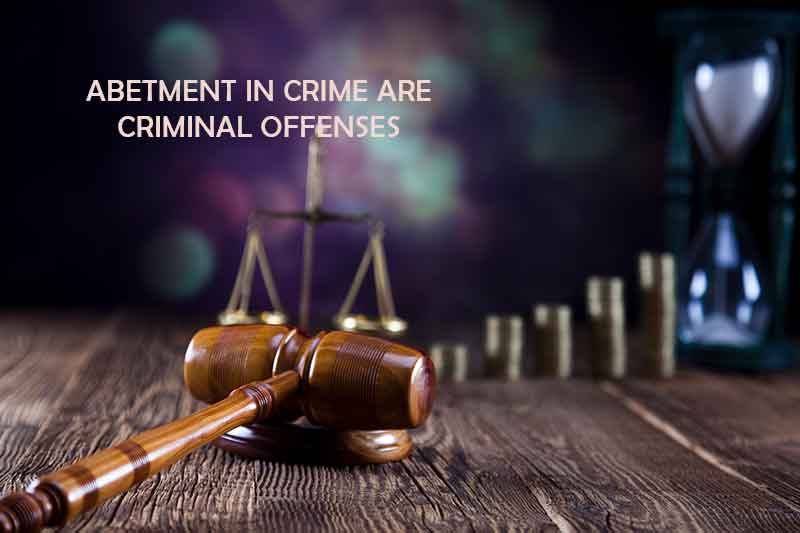The United Arab Emirates maintains a steadfast position on holding individuals accountable for criminal acts, encompassing not only the direct perpetrators but also those who aid or abet in the commission of unlawful activities. The concept of aiding and abetting entails the intentional facilitation, encouragement, or assistance in the planning or execution of a criminal offense. This legal principle ascribes culpability to individuals for their conscious involvement, even if they did not directly perpetrate the crime themselves. Within the UAE’s legal framework, aiding and abetting can result in severe penalties, often commensurate with the punishments prescribed for the principal offense.
Garnering a comprehensive understanding of the ramifications associated with this principle is of paramount importance for residents and visitors alike, as inadvertent actions or omissions can potentially implicate them in criminal proceedings, necessitating a thorough grasp of the relevant legal provisions.
What Constitutes Aiding and Abetting a Crime under UAE Law?
The United Arab Emirates’ current Penal Code, Federal Decree-Law No. 31 of 2021 [On the Issuance of the Crimes and Penalties Law], provides the legal definition of what constitutes aiding and abetting a crime. According to Articles 45 and 46 of this law, a person is considered an accomplice if they intentionally and knowingly assist or facilitate the commission of a criminal act.
Intention and knowledge of the crime are crucial factors in determining accomplice liability under UAE law. Mere presence at the scene of a crime, without active participation or intent to aid the perpetrator, does not automatically constitute aiding and abetting. The extent of an accomplice’s involvement dictates the severity of the penalty they face. Article 46 states that an accomplice may receive the same penalty as the perpetrator or a lesser punishment, depending on the specific circumstances and their level of participation in the criminal act.
Some examples of actions that could constitute aiding and abetting under UAE law include providing weapons, tools or other means to commit the crime, encouraging or instigating the perpetrator, assisting in the planning or execution stages, or helping the perpetrator evade justice after the fact.
It is important to note that the legal interpretations and applications are ultimately at the discretion of UAE judicial authorities on a case-by-case basis.
Iinkalo zoNcedo
Ukuze isenzo sifaneleke njengoncedo, izinto ezimbini eziphambili kufuneka zihlangane:
- Actus Reus (Umthetho onetyala): Oku kubhekiselele kwizenzo ezithile zokuphembelela, ukubandakanyeka kwiyelenqe, okanye ukunceda ngabom. I-Actus reus licandelo eliphathekayo lolwaphulo-mthetho, elifana nesenzo sokukhuthaza umntu ukuba aphange okanye abonelele ngeendlela zokwenza oko.
- Mens Rea (Ingqondo enetyala): Umbhexeshi kufuneka abe nenjongo yokucaphukisa, ukunceda, okanye ukuququzelela ukwenziwa kolwaphulo-mthetho. I-Mens rea ibhekiselele kwinto esengqondweni yolwaphulo-mthetho, njengenjongo yokunceda umntu enze isenzo solwaphulo-mthetho.
Ukongeza, akukho mfuneko ngokubanzi yokuba ulwaphulo-mthetho oluxhonyiweyo luqhutywe ngempumelelo kuxanduva phantsi komthetho wolawulo. I-abettor inokutshutshiswa ngokusekelwe kuphela kwiinjongo zabo kunye nezenzo zokukhuthaza ulwaphulo-mthetho, nokuba ulwaphulo-mthetho ngokwalo aluzange lugqitywe.
Iindidi okanye iiFom zokuBetment
Kukho iindlela ezintathu eziphambili zoku ulwaphulo-mthetho ukuphazamiseka kunokwenzeka:
1. Ukuphembelela
Ichazwe ngokuthe ngqo okanye ngokungathanga ngqo bongoza, ukucaphukisa, khuthaza, okanye ukucela omnye umntu ukuba enze ulwaphulo-mthetho. Oku kunokwenzeka ngamazwi, izijekulo, okanye ngezinye iindlela zonxibelelwano. Ukuphembelela kufuna ukubandakanyeka okusebenzayo kunye nenjongo yolwaphulo-mthetho. Ngokomzekelo, ukuba ubani uxelela umhlobo wakhe ngokuphindaphindiweyo ukuba aphange ibhanki aze amchazele ngokweenkcukacha indlela yokwenza oko, usenokuba netyala lokuphembelela olo lwaphulo-mthetho, kwanokuba umhlobo wakhe akaze awulandele.
2. Iyelenqe
An isivumelwano phakathi kwabantu ababini okanye ngaphezulu ukwenza ulwaphulo-mthetho. Kujongwa rhoqo uhlobo olunzima kakhulu lokuxhatshazwa, iyelenqe lifuna nje isivumelwano, nokuba uwaphi na amanyathelo okanye amanyathelo athathiweyo. Iyelenqe linokubakho nokuba abantu abakhe balwenze ulwaphulo-mthetho olucetyiweyo.
3. UkuNcedisa ngabom
Ukubonelela ngoncedo okanye izixhobo ezifana nezixhobo, ezothutho, iingcebiso ezinceda ngabom kwisenzo solwaphulo-mthetho. Ukunceda ngabom kufuna ukuthobela kunye nenjongo. Ubutyala busebenza nokuba u-abettor akakho ngokwasemzimbeni kwindawo yolwaphulo-mthetho. Ngokomzekelo, ukuba umntu uboleka imoto yakhe kumhlobo wakhe ukuba ayisebenzise xa ephanga, unokuba netyala lokunceda ngabom ulwaphulo-mthetho.
Difference between Abettor and Offender
| Abettor (Accomplice) | Offender (Perpetrator) |
|---|---|
| An abettor or accomplice is an individual who intentionally aids, facilitates, encourages, or assists in the planning or execution of a criminal act. | An offender, also known as a perpetrator, is the individual who directly commits the criminal act. |
| Abettors do not directly commit the crime themselves but knowingly contribute to its commission. | Offenders are the principal actors who carry out the unlawful act. |
| Abettors can be held liable for their role in supporting or enabling the crime, even though they did not personally carry it out. | Offenders are primarily responsible for the criminal offense and face the full extent of the prescribed punishment. |
| The level of involvement and intent determines the extent of an abettor’s culpability and punishment, which may be equal to or lesser than the offender’s. | Offenders typically receive the maximum penalty for the committed crime, as they are the direct perpetrators. |
| Examples of abetting actions include providing weapons, tools, or assistance, encouraging or instigating the crime, aiding in planning or execution, or helping the offender evade justice. | Examples of offender actions include physically committing the criminal act, such as theft, assault, or murder. |
| Abettors can be charged as accomplices or co-conspirators, depending on the specific circumstances and their level of involvement. | Offenders are charged as the principal perpetrators of the crime. |
This table highlights the key differences between an abettor (accomplice) and an offender (perpetrator) in the context of criminal acts, based on their level of involvement, intent, and culpability under the law.
Punishment for Abetting a crime in UAE
According to the UAE Penal Code (Federal Decree-Law No. 31 of 2021), the punishment for abetting a crime depends on the nature of the abettor’s involvement and the specific crime they aided or abetted. Here’s a table outlining the potential punishments based on different types of abetment:
| Primary Type | inkcazelo | Isohlwayo |
|---|---|---|
| Instigation | Deliberately encouraging or urging another individual to engage in criminal conduct. | Equivalent to the penalty imposed on the principal offender if the instigator was aware of the intended crime (Article 44 of the UAE Penal Code). |
| Iyelenqe | A premeditated agreement among two or more parties to carry out an unlawful act. | Conspirators are generally subjected to the same punishment as the main perpetrator. Nonetheless, the judge retains discretionary power to reduce the sentence (Article 47 of the UAE Penal Code). |
| Intentional Aiding | Knowingly providing assistance or support to another person with the understanding that they plan to commit a crime. | The severity of the penalty varies, contingent upon the gravity of the offense and the degree of assistance rendered. Punishments can range from monetary fines to incarceration (Article 48 of the UAE Penal Code). |
What are the defenses Against Abetment Charges in UAE
Ngelixa i-abetment ithathwa njengetyala elibi, kukho iindlela ezininzi ezisemthethweni ezinokuthi zisetyenziswe ngummeli wokhuselo lolwaphulo-mthetho onamava:
- Ukungabikho kwenjongo efunekayo okanye ulwazi: Ukuba u-abettor wayengenanjongo yokunceda okanye ukukhuthaza ulwaphulo-mthetho, okanye wayengazi ngobugwenxa bezenzo, oku kunokubonelela ngokukhusela.
- Ukurhoxa kwiyelenqe lolwaphulo-mthetho: Ukuba ummeli uye warhoxa kwiyelenqe phambi kokuba ulwaphulo-mthetho lwenziwe kwaye athathe amanyathelo okuthintela ukwenzeka kwalo, oku kunokungabuphenduli ubutyala.
- Ukubanga ukunyanzeliswa okanye ukunyanzeliswa: Ukuba ummeli uye wanyanzeliswa ukuba ancede okanye akhuthaze ulwaphulo-mthetho phantsi kwesoyikiso sokwenzakala okanye ubundlobongela, oku kunokusebenza njengendlela yokuzikhusela.
- Ukubonisa ukungaphumeleli kwesizathu esisondeleyo phakathi kwezenzo kunye nolwaphulo-mthetho: Ukuba izenzo zommeli azizange zibe negalelo ngokuthe ngqo ekwenzeni ulwaphulo-mthetho, oku kungenza buthathaka ityala lomtshutshisi lokumisela ubutyala.
- Mistake of fact: If the abettor had a reasonable belief that the act they aided or abetted was not illegal, based on a mistake of fact, this could provide a defense.
- Entrapment: If the abettor was induced or entrapped by law enforcement to aid or abet the crime, this could potentially serve as a defense.
- Statute of limitations: If the prosecution of the abetment charge is brought after the legally prescribed time limit or statute of limitations, this could result in dismissal of the case.
Ukuqonda amacebo anokubakho kunye nokusetyenziswa kwezandulela zomthetho ngundoqo wokwakha ukhuselo olusebenzayo ngokuchasene neentlawulo zokugwetyelwa.
isiphelo
Ulwaphulo-mthetho lwe-abetment akufanele luthathwe lula kwi-UAE. Ukukhuthaza, ukuphembelela, okanye ukuncedisa kuso nasiphi na isenzo solwaphulo-mthetho kunezohlwayo eziqatha, nokuba ulwaphulo-mthetho ngokwalo aluzange lwenziwe ngempumelelo. Ukuqonda okuqinileyo kweempawu ezithile, iintlobo ze-abetment, imithetho yesohlwayo, kunye nokhuseleko olusemthethweni olunokubakho kubalulekile kubo bonke abemi be-UAE ukunqanda ukuzibophelela ngale mithetho intsonkothileyo. Ukubonisana negqwetha elinamava lokhuselo lolwaphulo-mthetho kwangethuba kungathetha umahluko phakathi kokuvalelwa iminyaka entolongweni okanye ukuphepha ukutshutshiswa ngokupheleleyo.
Ukuba uye waphandwa, wabanjwa, okanye utyholwa ngolwaphulo-mthetho olunxulumene nokuxhaswa kwi-UAE, kubalulekile ukuba ufune igqwetha ngokukhawuleza. Igqwetha elinolwazi linokukukhokela kwinkqubo yezomthetho, likhusele amalungelo akho, kwaye liqinisekise ngesona siphumo sifanelekileyo setyala lakho. Ungazami ukuzulazula kwizinto ezintsonkothileyo zemithetho ye-abetment ngokwakho - gcina ummeli wezomthetho ngokukhawuleza.
Umthetho wakho ukubonisana nathi iya kusinceda siqonde imeko yakho nezinto ezikuxhalabisayo. Qhagamshelana nathi ukucwangcisa intlanganiso. Sitsalele umnxeba ngoku ukuqeshwa okungxamisekileyo kunye neNtlanganiso ku +971506531334 +971558018669

